Basal Cell Carcinoma
Basal cell carcinomas can present on your skin in varying forms including growths or lesions as red patches of skin, pink growths, open sores and shiny bumps. Basal cell carcinomas are commonly caused by overexposure to ultraviolet (UV) rays. Basal cell carcinomas are rarely life-threatening when treated properly.
Almost three million people each year are diagnosed with basal cell carcinomas. Basal cell carcinomas appear most frequently in people whose lifestyles expose them to unsafe levels of UV rays. Though the average age of basal cell carcinoma patients is declining, it is still most frequent in people over age 40. People with fair skin, blond or red hair are also more susceptible as are people with blue, green or grey eyes. Men are also at higher risk.
Examples of Basal Cell Carcinoma
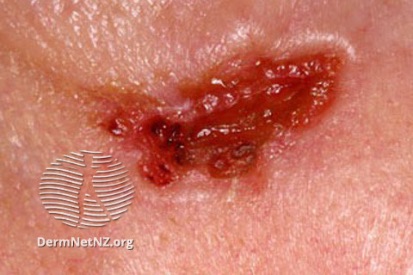
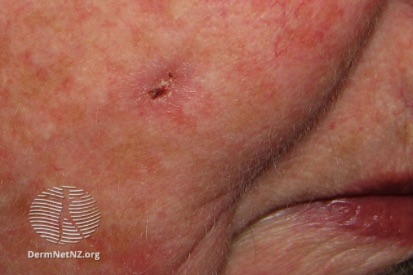
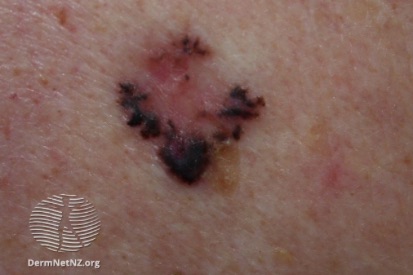
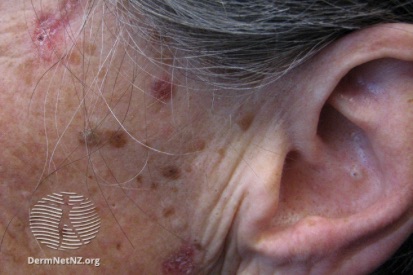

Symptoms of Basal Cell Carcinoma
- Basal cell carcinoma (BCC) often begins as persistent wounds or sores.
- BCC can appear as reddish areas on sun-exposed parts of the body such as the face, neck, arms, and legs.
- BCC might resemble scars, pink growths, or shiny bumps.
- In some cases, they bear a resemblance to moles, contributing to misidentification.
Causes of Basal Cell Carcinoma
- Basal cell carcinoma is caused by spending too much time in the sun.
- Getting sunburnt, especially as a child, increases the risk of BCC.
- Family history of skin cancer.
- A weakened immune system, and exposure to certain environmental toxins can also contribute.
How to Prevent Basal Cell Carcinoma
- Sunscreen is Your Shield: Regularly apply a broad-spectrum sunscreen with at least SPF 30 on all exposed skin, even on cloudy days. Reapply every two hours or more frequently if swimming or sweating.
- Cover Up: Wear protective clothing such as long-sleeved shirts, wide-brimmed hats, and sunglasses to minimize direct sun exposure.
- Avoid Peak Sun Hours: Limit outdoor activities during the sun's strongest hours, usually from 10 a.m. to 4 p.m. If possible, seek shade under trees or use an umbrella.
- Protective Gear for Outdoor Activities: If you're engaging in outdoor sports or activities, consider using sun-protective clothing and gear to create an extra barrier against UV rays.
- Regular Skin Checks: It's essential to schedule annual skin checks with your dermatologist. Early detection is critical to effective treatment plans.
Basal Cell Carcinoma FAQs
Individuals with fair skin, a history of frequent sun exposure, or a family history of skin cancer are at higher risk. However, anyone can develop BCC.
Dermatologists diagnose BCC by examining the skin lesion and might perform a biopsy to confirm the presence of cancerous cells.
Yes, Mohs micrographic surgery is an effective treatment option for Basal Cell Carcinoma (BCC). Mohs surgery is a specialized and precise technique primarily used to remove skin cancers, especially those in areas where preserving healthy tissue is critical, such as the face, ears, nose, and other cosmetically sensitive regions.
In Mohs surgery, the surgeon removes thin layers of cancerous tissue, immediately examining each layer under a microscope. This process continues layer by layer until no cancer cells are visible, ensuring that the cancerous cells are removed while minimizing the removal of healthy surrounding tissue. This technique allows for precise removal of cancer cells while preserving as much healthy tissue as possible, leading to better cosmetic outcomes, especially in delicate areas.
Mohs surgery is often recommended for BCCs that are large, have ill-defined borders, are located in areas where tissue preservation is crucial (such as the face), or have a higher risk of recurrence. It offers high cure rates, with minimal damage to the surrounding healthy tissue, making it an excellent choice for treating certain types of Basal Cell Carcinoma. However, the decision for Mohs surgery or other treatment options depends on various factors, including the type, size, and location of the BCC, as well as individual patient factors, which should be discussed with a dermatologist or skin cancer specialist.
BCC can recur in the same area. Regular skin checks and follow-ups are crucial for early detection and prompt treatment if it reappears.
Continuing sun protection measures, regular self-examinations, and routine skin checks with a dermatologist are key to preventing recurrence.
A Total Body Skin Examination (TBSE) is a comprehensive evaluation of a person's skin from head to toe conducted by a dermatologist or healthcare professional. During this examination, the healthcare provider systematically inspects the skin, including areas that are not typically exposed to sunlight, to assess for any signs of skin cancer, abnormal moles, or other skin conditions.
The exam usually involves the patient removing all clothing and wearing a gown or drape provided by the healthcare professional. The dermatologist examines the skin, scalp, face, neck, trunk, arms, legs, hands, feet, fingernails, and toenails, checking for any suspicious lesions, moles, discolorations, or changes in existing moles or spots.
The purpose of a Total Body Skin Exam is early detection of skin cancers such as melanoma, basal cell carcinoma, and squamous cell carcinoma, as well as other skin conditions. It allows healthcare providers to identify any concerning areas that might require further evaluation, biopsy, or treatment.
Patients are often encouraged to have regular Total Body Skin Exams, especially if they have a history of skin cancer, numerous moles, a family history of skin cancer, or if they spend significant time in the sun. These exams aid in the early detection and management of skin conditions, potentially improving outcomes and reducing the risk of complications associated with skin cancers.
From our QualDerm Family of Brands: Non-Melanoma Skin Cancers
How to Treat Basal Cell Carcinoma
- Mohs Micrographic Surgery: This specialized surgery is commonly used for skin cancers like Basal Cell Carcinoma, particularly in sensitive areas. Mohs surgery excels in preserving healthy tissue, boasting a high cure rate of around 98% for primary, non-recurrent cases.
- Excisional Surgery: In this procedure, a small margin of surrounding healthy tissue is removed to prevent the cancer from spreading.
- Electrodesiccation and Curettage: After numbing the area, the growth is scraped off and cauterized (burned) to eliminate remaining tumor cells and control bleeding. This method is not ideal for advanced cases or growths in sensitive areas.
- Topical Therapeutic Options: Certain creams or ointments can be considered for specific lesions. Your dermatologist will discuss these options based on the characteristics of the Basal Cell Carcinoma.
Related Blog Posts
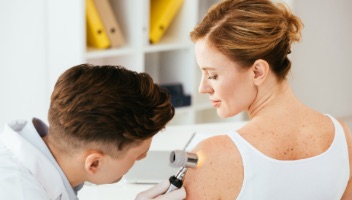
- Skin Cancer
- General Dermatology
- Skin Exams
- Sun Safety
If your dermatologist finds a suspicious mole during your TBSE, hey want to perform a skin biopsy.
Read More
- Skin Cancer
- Skin Exams
It’s time to face the facts: skin cancer can develop in individuals of all skin colors, including those with darker skin tones.
Read More
- Skin Cancer
- Skin Exams
In this blog, we’re covering what you need to know about five dangerous skin cancers, including basal cell carcinoma (BCC), squamous cell carcinoma (SCC), malignant melanoma, merkel cell carcinoma, and kaposi sarcoma.
Read More